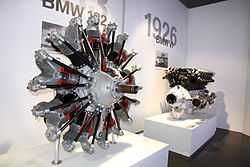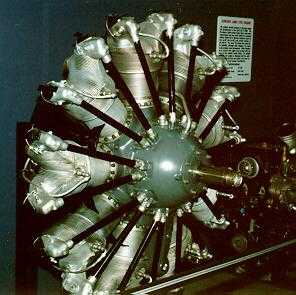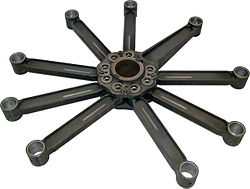BMW 132
The BMW 132 was a nine-cylinder radial aircraft engine produced by BMW starting in 1933.
Design and development
BMW took over the license for manufacturing air-cooled radial engines from US aircraft manufacturer Pratt & Whitney Aircraft Company on 3 January 1928. The nine-cylinder model Pratt & Whitney Hornet was initially manufactured virtually unchanged under the designation BMW Hornet. Soon BMW embarked on its own development. The result was the BMW 132 that went into production in 1933, which was essentially an improved version of the Hornet engine. A number of different versions were built. Aside from the carburetor designs used mainly in civilian aircraft, versions with direct fuel injection were manufactured for the German Luftwaffe. The engines had a displacement of 27.7 liters and generated up to 960 PS (947 hp, 706 kW) depending on model.
The 132 found widespread use in the transport role, remaining the primary powerplant of the Junkers Ju 52 for much of its life, turning the BMW 132 into one of the most important aeroengines for civilian aircraft during the 1930s.
Numerous pioneering flights were undertaken with the BMW 132. The most impressive was the first direct flight from Berlin to New York in a Fw 200 S-1 Condor equipped with four BMW 132 engines. It covered the distance to New York in 24 hours and 57 minutes on 10 August 1938.

BMW 132 engine
Variants
- 132A
- 725 PS (715 hp, 533 kW)
- 132Dc
- 850 PS (838 hp, 625 kW)
- 132De
- 880 PS (868 hp, 647 kW)
- 132J/K
- 960 PS (947 hp, 706 kW)
- 132N
- 865 PS (853 hp, 636 kW)
- 132T
- 730 PS (720 hp, 537 kW)
- ENMA Beta B-4 (Spanish license-built version)
- 785 PS (775 hp, 578 kW)[1]
Applications
Specifications (BMW 132 Dc)
Data from [2]
General characteristics
- Type: Nine-cylinder single-row supercharged air-cooled radial engine
- Bore: 155.6 mm (6 1⁄8 in)
- Stroke: 161.9 mm (6 3⁄8 in)
- Displacement: 27.7 l (1,690 in³)
- Length: 1,411 mm (55.55 in)
- Diameter: 1,380 mm (54.33 in)
- Dry weight: 525 kg (1,157 lb)
Components
Performance
See also
- Related development
- Related lists
References
External links
 |
Wikimedia Commons has media related to BMW 132. |
|
|---|
| | General | |
|---|
| | Military | |
|---|
| | Accidents / incidents | |
|---|
| | Records | |
|---|
| | Misc. | |
|---|
|

